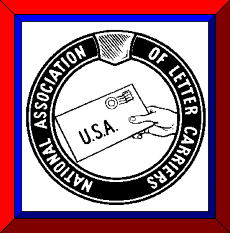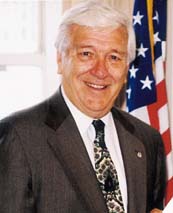

|
|
TThose of you who have already grappled with the first four parts of The Postal Record’s “Postal e-volution” series and are now looking forward to the fifth and final part in this issue might wish you had been aware before you began the series of Albert Einstein’s wry comment about the future. “I never think of the future,” one of the world’s greatest minds said. “It comes soon enough.”
Those of us less gifted and thus more likely to worry about such mundane issues as whether we’ll have a job five or 10 years down the road and, if so, what kind of a job, might do well not to follow Einstein’s maxim. After all, we don’t know exactly when many of the trends the “Postal e-volution” series has depicted in somewhat harrowing detail will set in. Nor should we be throwing in the towel and declaring ourselves victims of impersonal forces beyond our control.
As part five of the series in this issue makes clear, we can work to shape the future of the U.S. Postal Service and by doing so, maintain letter carriers’ jobs as good jobs, jobs worthy of the respect of the American people and worth a fair day’s pay for a fair day’s work.
“The Postal Service can survive—if it is allowed the freedom to compete fairly and squarely with the private sector.”
It will not be easy because the issues are complex, and our choices may be limited. Nevertheless, letter carriers and this union can and will participate actively in a debate that has, in essence, hardly begun. But ultimately, the American people and their elected representatives must decide what kind of a Postal Service this nation should have at a time when emerging technologies and the growth of private competitors threaten to undermine the very financial foundation of the Service.
As has been emphasized throughout the “Postal e-volution” series, the Postal Service can survive—if it is allowed the freedom to compete fairly and squarely with the private sector in the “un-protected” areas of the mail stream, namely expedited mail and parcels, and also expand its services to utilize the new technologies that “add value” to traditional mail products as well as offer alternatives to these products. How much commercial freedom the Service will be granted and under what conditions remains to be seen.
What is not in question is that the NALC will be fighting alongside postal management to secure greater commercial freedom for the USPS. In fact, we will be pushing and prodding management to develop new products and new services, to adapt to both the threats and the opportunities the digital revolution is spawning, and to compete aggressively and effectively with the United Parcel Services of the world.
There’s just one problem—and it’s a very real one: This union was founded almost 111 years ago partly and secondarily to further the interests of the then-Post Office Department, but chiefly to protect the interests of this nation’s letter carriers.
That is our mission, our major reason for existing—to safeguard the wages, benefits and working conditions of the men and women who carry the nation’s mail.
So the problem today—a problem that never before has confronted this union and, for that matter, the other postal unions whether they recognize it or not—is how can we help management adapt to the new realities of a digitized, competitive, increasingly free market environment while at the same time protecting and preserving the interests of the members we represent.
Let me make perfectly clear what the Grade 6 fight should have made clear to both the Postal Service and every NALC member—this union will always fight for the wages and benefits and working conditions of its members, no matter what.
So yes, we want jobs—but we want good jobs, jobs that allow us to provide for ourselves and our families. And this means pay and benefits that fairly compensate us for the jobs we perform.
Which is what the Grade 6 fight was all about.
But we have to remember why Arbitrator Fleischli awarded us Grade 6. Simply put, he agreed with our argument that as a result of the automation of mail processing and the USPS’s need to enhance the “value of the mail” through tracking and other services, the job of a letter carrier had become far more demanding in recent years—and, therefore, we should be rewarded for performing a more difficult job.
But why did the job become more difficult? Obviously it was largely because management, in its efforts to increase the productivity of its operations, automated mail processing so an increasing proportion of the mail would come to your case in delivery point sequence.
To be fair, management wasn’t trying to make your job harder. Management simply wanted to cut costs, so it could hold down postage rates, retain as much mail in the system as possible, and thus compete successfully with its competitors.
Not a bad reason to cut costs.
And after all, mail volume did grow for most of the last decade, as did revenue and jobs.
But because of automation, your job did become more demanding—which is why you’ll soon be paid more for doing it.
The rub, of course, is that from management’s point of view, the Service must continue to automate and add new services. If you’ve already read the first four parts of the “Postal e-volution” series with its discussion of the onset of a “vicious cycle” should the amount of “good” mail—mail that contributes substantially to the Service’s “overhead” or fixed costs—declines significantly, then you understand why the Service is committed to providing new products and new services to keep its revenue stream flowing.
“We won’t allow the Service to secure its future by weighing you down—by bending your backs, by making a difficult job impossible.”
This could mean down the road that your job will take on added responsibilities and burdens.
But there’s only so much you can be expected to do—which is why the NALC will monitor and, when necessary, challenge each and every innovation or added burden that threatens your health and welfare.
We want the Postal Service to succeed. In fact, it’s fair to say that there’s no other organization within the postal community that cares as much about the survival of the Postal Service as the NALC does.
But we won’t allow the Service to secure its future by weighing you down—by bending your backs, by making your jobs unbearable, by making a difficult job impossible.
In the end, your job will change. You may be asked to perform new and, we would hope, challenging duties. Perhaps management will want you to work with business customers as door-to-door sales agents and product expediters. Or maybe some day you’ll be delivering non-traditional products in new ways. In fact, you’re very likely to be using new equipment and compiling and transmitting new information.
But whatever you’re asked to do and however you’re asked to do it, there’s only so much a letter carrier can accomplish in an eight-hour day, and there’s only so much management can demand from you.
Fortunately, an aggressive union—one that cares about both the Postal Service and its letter carriers—will be waiting and watching. If necessary, we will be drawing lines in the sand so that management knows that when the future comes, it’ll be a future of promise and possibilities for its employees as well as its customers—and not a future of unreasonable stresses and strains.
In the end, the Postal Service will survive only if all of us who care deeply about this venerable and vital public service can persuade Congress to make the right decisions. And this means that Congress must reshape and liberate the Postal Service in a way that acknowledges the impact of digital communications on the Postal Service, recognizes the importance of the Service’s historic mission to provide universal service to the American public and unshackles the Postal Service from the legal and regulatory chains that are presently being pulled tighter and tighter around an institution struggling mightily to become free.
Of course, when that day finally comes—as it must— then maybe we, like Albert Einstein, can stop thinking about the future.
And start enjoying it.
|
|
© copyright, the National Association of Letter Carriers, all rights reserved.
|
|
Return to NALC homepage, The Postal Record or NALC Publications. This page was last updated July 7, 2000.
If you have questions or comments about technical aspects of the NALC homepage, please write to the National Association of Letter Carriers at 100 Indiana Ave., NW, Washington, D.C. 20001-2144 or send e-mail to nalcinf@nalc.org.
Please direct all other comments or inquiries in writing to the National Association of Letter Carriers at 100 Indiana Avenue, NW, Washington, D.C. 20001-2144 -- see the bottom of the NALC homepage for more specific information .